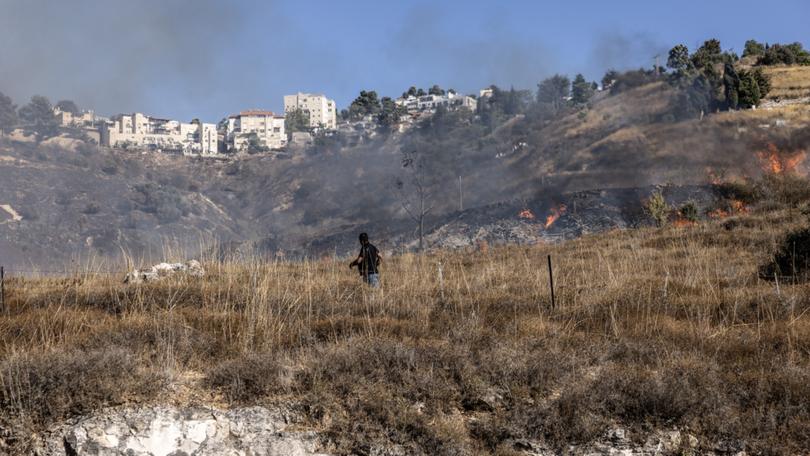THE WASHINGTON POST: Ground offensive preceded by year of secret raids in Lebanon, Israel says
THE WASHINGTON POST: Israel’s ongoing ground offensive in Lebanon was preceded by dozens of secret raids across the border over the past year, the Israel Defense Forces said.

Israel’s ongoing ground offensive in Lebanon was preceded by dozens of secret raids across the border over the past year, the Israel Defense Forces said.
No Israeli soldiers were killed in the clandestine raids, Israel said. Before Tuesday, Israeli officials gave scarcely a hint that they were underway.
Israel was widely assumed to be operating on the Lebanese side of the border and confirmed to the Guardian in April that four Israeli soldiers were injured there by Hezbollah bombs. But there was little previous indication of the extent of the operations revealed Tuesday in remarks by Rear Adm. Daniel Hagari, an Israel Defense Forces spokesman. Israeli forces carried out more than 70 raids, over a period of hundreds of days and 200 nights, according to an IDF official, who spoke on the condition of anonymity under the ground rules of a news briefing. The Israel Defense Forces took out more than 1000 Hezbollah sites, the official said.
Sign up to The Nightly's newsletters.
Get the first look at the digital newspaper, curated daily stories and breaking headlines delivered to your inbox.
By continuing you agree to our Terms and Privacy Policy.Israel says Hezbollah was planning an attack similar to the one launched by Hamas on Israel on Oct. 7. The IDF has said one of its goals in Lebanon is to foil that possibility.
Hagari said Tuesday that the clandestine operations conducted “since the beginning” of its war with Hamas, which followed the Oct. 7 attack, were focused on dismantling Hezbollah infrastructure near the border. The efforts were to help ensure that residents of northern Israel, who have evacuated amid frequent rocket attacks by Hezbollah forces in southern Lebanon, could return to their homes, Hagari said.
The raids did not appear to raise alarm on the northern side of the border - or at least the kind that makes its way into public remarks. The Lebanese army said it had not been aware of them. Hezbollah did not make public statements about them. And the U.N. peacekeeping force in Lebanon did not respond to requests for comment on the matter.
IDF special forces entered Hezbollah compounds in “dozens of locations,” Hagari said, where they collected intelligence, seized and dismantled weapons, and destroyed infrastructure.
The weapons found included “advanced Iranian-made weapons,” Hagari said. Hezbollah is believed to be the best-equipped group among the web of Iranian-backed groups in the region.
In one of the operations that Hagari described, IDF troops raided a home in which they said weapons were stored on the ground floor. A 500-foot tunnel extended underneath the home, he said. The house and the tunnel were destroyed in strikes by ground and air, he said. Another operation revealed what he said was a “network of trenches” and an underground tunnel that connected to a command centre, weapons storage and living spaces for militants.
A map detailing plans for the alleged attack by Hezbollah was also unearthed in the operation, he said. The information could not be verified independently.
The ongoing ground offensive that began Tuesday has already diverged markedly in scope from the preceding operations: While Israel reported no losses in the raids, it said eight soldiers were killed Wednesday in clashes with Hezbollah.
The U.N. Interim Force in Lebanon, the U.N. force that administers the Blue Line on the Israel-Lebanon border, said in a statement Tuesday that it was notified by Israel on Monday of the IDF’s intentions to “undertake limited ground incursions into Lebanon.”
The U.N. force, known as UNIFIL, said that “any crossing into Lebanon is in violation of Lebanese sovereignty and territorial integrity.” It added that it was a violation of U.N. resolution 1701, which in 2006 following the Israel-Hezbollah war mandated that there be no foreign forces in Lebanon without the Lebanese government’s consent. A spokesperson did not respond to requests for comment on whether UNIFIL was aware of the previous raids or whether they represented similar violations of the resolution.
The resolution also required the disarmament of all armed groups in Lebanon and prohibited any “weapons or authority in [Lebanon] other than that of the Lebanese State.” Hagari said Lebanon and UNIFIL have “failed to enforce” the resolution amid Hezbollah’s buildup.
Disclosing the raids as it begins the ground incursion allows Israel to highlight Hezbollah’s buildup of offensive infrastructure for an Oct. 7-style attack, said Jonathan Lord, senior fellow and director of the Middle East Security program at the Center for a New American Security, a Washington-based think tank.
By “pulling back the curtain on all of the secret infrastructure that Hezbollah has built in southern Lebanon, not for a defensive purpose but for clearly an offensive purpose,” Lord said, Israel “creates the pretense and the public support for them to do this ground operation to clean it all up.”
- - -
Berger reported from northern Israel. Mohamad El Chamaa in Beirut contributed to this report.
© 2024 , The Washington Post
